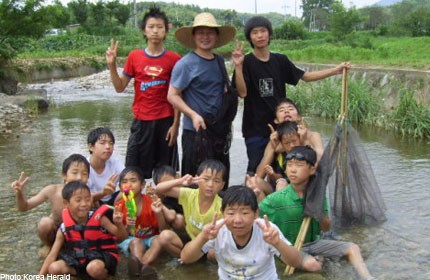Opening doors for abused children

Many of the children Hwang Chum-gon helps have been beaten until their bones broke, or starved until they took to the streets in search of food.
But Rev. Hwang has made it his life's work to help Korea's neglected kids, who are hungry for food and love.
He recalled his first meeting with one child as he wrote to introduce his Open Door Youth Foundation.
"I've seen many abused children so far, but never saw the one like her whose figure was so miserable because of the severe abuse from her parents.
"All of her body was covered with wounds... her face was all red with bruises, and her wrist and ankle bones were fractured. And she was as thin as a Somali child who's starving to death. We couldn't say anything to the child who was so afraid of people."
The little girl, to whom he gave the pseudonym Yoon-chung to protect her identity, was so damaged that she had developed androphobia - a fear of men - when she first arrived at the charity offering shelter and therapy for kids that have been seriously neglected or abused.
She was taken in by Hwang at his Open Door center, but would not talk and bolted down her food so quickly that she immediately threw it back up, reacting violently to her surroundings.
"One day, she grabbed a goldfish from the fish basin and threw it to the floor," Hwang recalled. "She started to cut it to pieces with scissors. She was expressing her anger by cutting the goldfish into pieces. That was a big shock to us.
"But instead of scolding, we had to give her a warm hug."
Her case may have been extreme, but Yoon-chung is just one of 10,000 children that have walked through the doors of Open Door's three therapeutic kids centers in Korea.
Many take a while to adjust to the peaceful surroundings of the homes and therapy rooms in Seoul, Chungju and Yangpyeong, but the organization houses and helps 40 children at a time regardless of their behavioral problems.
Hwang started the charity after three years of serious illness, during which he pledged to help others if he ever regained his health.
Upon recovery, he started walking the streets at night to help needy children after hearing of the death of one little girl at the hands of her abusive parents.
"Too many children were wandering the night street with no place to go," Hwang wrote. "Among them were children who couldn't bear their parents' severe abuse, who were driven out from the break up of family, and who were abandoned by their parents and were saying 'there's no tomorrow and no hope.'
"The most heartbreaking thing was many children were sleeping on a bench with a newspaper as a comforter on winter nights ... After I heard their stories and knew their circumstances, I couldn't eat three meals a day and couldn't sleep in a warm room. Anyhow, I tried to help them and brought (a) few of them to my house every night."
Over time, Hwang came up with the idea of starting Open Door - a place where kids could get different therapies to help them heal from their various life problems.
Since the charity launched in March 1990, the centers have helped around 10,000 kids and teenagers recover from problems ranging from domestic abuse, computer addiction and abuse in school.
Whatever their circumstances, Hwang has learned to love all the children equally, as he and his wife Lee Ok-ju, a counselor and professor in play therapy, decided against having their own kids in order to help others.
"When we got married we agreed not to have our own child, but just to look after these children. These are our children now," he said.
The kids stay at Open Door for varying lengths of time.
Hwang said that abused kids took up to a year to settle into the centers and often needed to be treated for twice the length of time as the duration of the abuse to properly heal, though knowledge of the abandonment by their parents will always leave "big scars that can't ever be erased."
Like other children using the center, Yoon-chung played in nature - re-socializing through therapies that encouraged her to play with animals, and take part in music, art and gardening.
The charity receives no government funding for the therapeutic work that Hwang says is often neglected in the drive to provide for neglected children's material needs of food and shelter.
And although meeting the annual 500 million won (S$173,204) costs of operations through donations is a struggle, Hwang said: "I believe that if you set out to do good things, people are willing to help.
"My dream is to have a little mountain so that whoever the child was they could be cared for through nature, and having a little garden to educate the kids.
"My main goal is to care for these children and help them."
And after two years of such help, he said even Yoon-chung was able to find her smile.
"She and became talkative girl like her peer group. The child who occasionally said 'I'm afraid, I want to die' is now finding her own features."
For more information or to find out how to help go to: www.opencenter.or.kr."